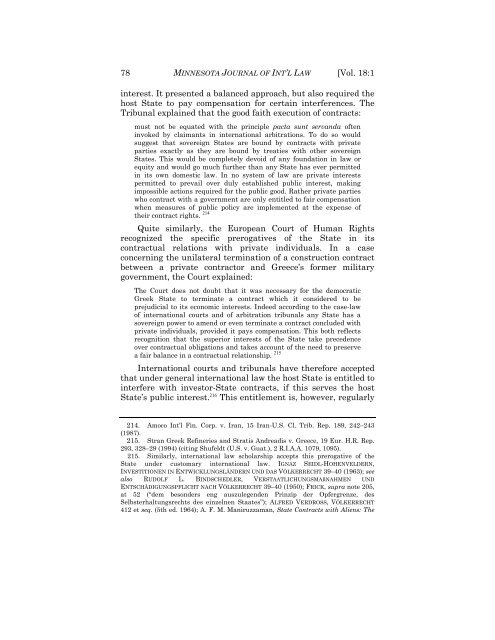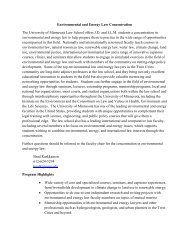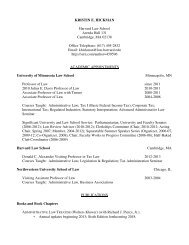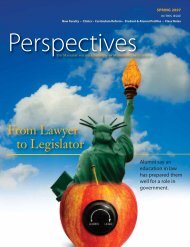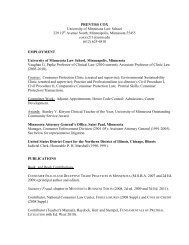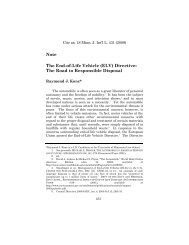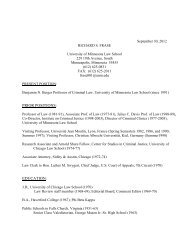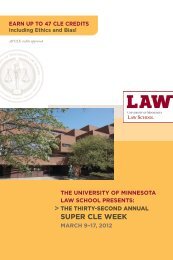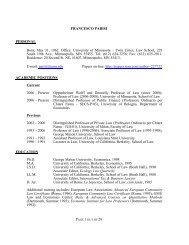Enabling Private Ordering - the University of Minnesota Law School
Enabling Private Ordering - the University of Minnesota Law School
Enabling Private Ordering - the University of Minnesota Law School
You also want an ePaper? Increase the reach of your titles
YUMPU automatically turns print PDFs into web optimized ePapers that Google loves.
78 MINNESOTA JOURNAL OF INT’L LAW [Vol. 18:1<br />
interest. It presented a balanced approach, but also required <strong>the</strong><br />
host State to pay compensation for certain interferences. The<br />
Tribunal explained that <strong>the</strong> good faith execution <strong>of</strong> contracts:<br />
must not be equated with <strong>the</strong> principle pacta sunt servanda <strong>of</strong>ten<br />
invoked by claimants in international arbitrations. To do so would<br />
suggest that sovereign States are bound by contracts with private<br />
parties exactly as <strong>the</strong>y are bound by treaties with o<strong>the</strong>r sovereign<br />
States. This would be completely devoid <strong>of</strong> any foundation in law or<br />
equity and would go much fur<strong>the</strong>r than any State has ever permitted<br />
in its own domestic law. In no system <strong>of</strong> law are private interests<br />
permitted to prevail over duly established public interest, making<br />
impossible actions required for <strong>the</strong> public good. Ra<strong>the</strong>r private parties<br />
who contract with a government are only entitled to fair compensation<br />
when measures <strong>of</strong> public policy are implemented at <strong>the</strong> expense <strong>of</strong><br />
<strong>the</strong>ir contract rights. 214<br />
Quite similarly, <strong>the</strong> European Court <strong>of</strong> Human Rights<br />
recognized <strong>the</strong> specific prerogatives <strong>of</strong> <strong>the</strong> State in its<br />
contractual relations with private individuals. In a case<br />
concerning <strong>the</strong> unilateral termination <strong>of</strong> a construction contract<br />
between a private contractor and Greece’s former military<br />
government, <strong>the</strong> Court explained:<br />
The Court does not doubt that it was necessary for <strong>the</strong> democratic<br />
Greek State to terminate a contract which it considered to be<br />
prejudicial to its economic interests. Indeed according to <strong>the</strong> case-law<br />
<strong>of</strong> international courts and <strong>of</strong> arbitration tribunals any State has a<br />
sovereign power to amend or even terminate a contract concluded with<br />
private individuals, provided it pays compensation. This both reflects<br />
recognition that <strong>the</strong> superior interests <strong>of</strong> <strong>the</strong> State take precedence<br />
over contractual obligations and takes account <strong>of</strong> <strong>the</strong> need to preserve<br />
a fair balance in a contractual relationship. 215<br />
International courts and tribunals have <strong>the</strong>refore accepted<br />
that under general international law <strong>the</strong> host State is entitled to<br />
interfere with investor-State contracts, if this serves <strong>the</strong> host<br />
State’s public interest. 216 This entitlement is, however, regularly<br />
214. Amoco Int’l Fin. Corp. v. Iran, 15 Iran-U.S. Cl. Trib. Rep. 189, 242–243<br />
(1987).<br />
215. Stran Greek Refineries and Stratis Andreadis v. Greece, 19 Eur. H.R. Rep.<br />
293, 328–29 (1994) (citing Shufeldt (U.S. v. Guat.), 2 R.I.A.A. 1079, 1095).<br />
215. Similarly, international law scholarship accepts this prerogative <strong>of</strong> <strong>the</strong><br />
State under customary international law. IGNAZ SEIDL-HOHENVELDERN,<br />
INVESTITIONEN IN ENTWICKLUNGSLÄNDERN UND DAS VÖLKERRECHT 39–40 (1963); see<br />
also RUDOLF L. BINDSCHEDLER, VERSTAATLICHUNGSMAßNAHMEN UND<br />
ENTSCHÄDIGUNGSPFLICHT NACH VÖLKERRECHT 39–40 (1950); FRICK, supra note 205,<br />
at 52 (“dem besonders eng auszulegenden Prinzip der Opfergrenze, des<br />
Selbsterhaltungsrechts des einzelnen Staates”); ALFRED VERDROSS, VÖLKERRECHT<br />
412 et seq. (5th ed. 1964); A. F. M. Maniruzzaman, State Contracts with Aliens: The


